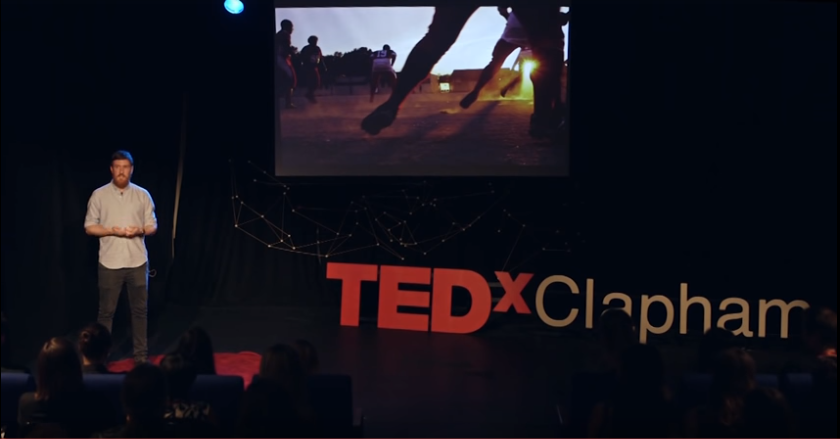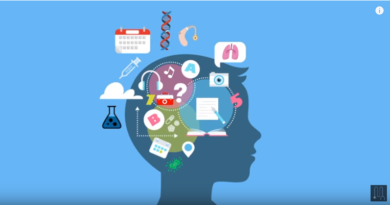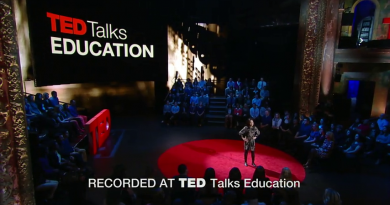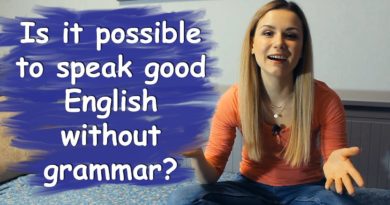Palestra proferida por Matthew Youlden, no TEDxClapham, Inglaterra. Em poucas palavras, o palestrante destaca que temos alguns atalhos e regras para o aprendizado de um idioma:
- Atalho 1: procure por semelhanças com o seu idioma nativo (ajuda a reconhecer padrões e auxilia na compreensão do significado)
- Atalho 2: Não complique
- Atalho 3: Mantenha seu estudo relevante à sua situação e necessidades
- Atalho 4: Estude 30 minutos por dia ou estude em períodos menores com regularidade.
- Atalho 5: Ouça rádio, assista filmes com legendas
Além disto, o autor destaca 4 regras para o aprendizado:
- Regra 1: Viva o idioma
- Regra 2: Erre muito
- Regra 3: Divirta-se. Competição amigável é saudável
Na prática, a maioria dos poliglotas (Matthew Youlden conhece 20 idiomas e é fluente em 10), com alguma variação, recomendam aproximadamente as mesmas coisas.
Para fazer o download do áudio desta palestra, clique aqui.
#Enjoy 🙂
| English Transcript | Portuguese Translation |
|---|---|
| Learning a language can feel a bit like rocket science, something out of this world and out of reach for the vast majority of us. | Aprender uma língua pode parecer muito complicado, algo do outro mundo, fora do alcance da maioria de nós. |
| This isn't a belief, however, just held by many English monolinguals on our island. | Essa não é uma crença apenas de quem só fala inglês em nossa ilha. |
| It's also shared by many of our linguistic cousins further afield, say, in the United States or Australia. | mas também é compartilhada por muitos de nossos primos linguistas em locais distantes, como Estados Unidos ou Austrália. |
| Let's be honest: when it comes to learning languages or speaking them, we are the kind of people that likes to think we're fluent in a multitude of diverse languages such as Geordie, Kiwi, Cockney, or what about Canadian? | Vamos ser sinceros: em se tratando de aprender ou falar línguas, gostamos de pensar que somos fluentes numa porção de línguas diferentes, como os dialetos "geordie", "kiwi", "cockney", ou que tal canadense? |
| Don't get me wrong. | Não me leve a mal. |
| I'm very, very proud of my Mancunian heritage, but I wouldn't suggest it's a separate language just yet. | Sinto muito orgulho da minha descendência de Manchester, mas eu não diria que se trata de uma língua separada. |
| After all, we don't need subtitles when we are watching Coronation Street, now do we? | Afinal, não precisamos de legendas quando assistimos Coronation Street, precisamos? |
| Although I can see you two saying, "I do." | Embora eu possa ver os dois ali dizendo: "Eu preciso". |
| Yet, despite this, if you were to cross the Channel, or say, if you're feeling slightly more adventurous, cross the Severn Estuary into Wales, there you would find that speaking another language or being bilingual is simply a reality. | Ainda assim, se você tiver que atravessar o Canal, ou digamos, se estiver se sentindo um pouco mais aventureiro, atravessar o Severn Estuary para o País de Gales, lá você vai descobrir que falar outra língua ou ser bilíngue é simplesmente uma realidade. |
| Yet, there and further afield, many are still convinced of the fact this is a long, challenging, somewhat painful, and dare I say, daunting task. | No entanto, lá e ainda mais longe, muitos ainda estão convencidos que isso é algo demorado, desafiador e, de alguma forma, doloroso e, me atrevo dizer, uma tarefa desafiadora. |
| In this room of 100 people, I'd guess that at least 15 other languages are spoken besides English. | Nesta sala de 100 pessoas, eu suponho que pelo menos 15 outras línguas são faladas além do inglês. |
| In fact, the last census of 2011 revealed that a staggering 22% of Londoners - that's 22%, one in four, almost - speak another language at home apart from English. | Na verdade, o último censo de 2011 revelou que 22% do povo de Londres, o que significa quase um em cada quatro, fala outra língua em casa além do inglês. |
| I myself, even as a Mancunian, speak approximately 20 languages, and of those, around half I speak fluently. | Até mesmo eu, como "mancunian", falo aproximadamente 20 línguas, e dessas, cerca de metade falo fluentemente. |
| And the question I get asked by people the most is, "Why?" | E a pergunta que a maioria das pessoas me faz é: "Por quê?" |
| Well, the answer, for me at least, is rather simple. | Bem, a resposta, pelo menos para mim, é muito simples. |
| I'm convinced learning languages, any language per Se, is actually easy. | Estou convencido de que aprender línguas, qualquer língua, é, na verdade, fácil. |
| And I want to show you how. | E quero mostrar a vocês como. |
| As a linguist, a polyglot, and a lecturer, I know what it entails to learn and study a language. | Como linguista, poliglota e palestrante, sei o que significa aprender e estudar uma língua. |
| And one of the biggest obstacles we're faced [with] when learning are myths. | E um dos maiores obstáculos que enfrentamos, enquanto aprendemos, são os mitos. |
| And I genuinely believe that we have to debunk them. | E eu realmente acredito que temos que desmascará-los. |
| In order to remember these more effectively, I came up with the nice and friendly sounding acronym D.I.E. which funnily enough, if you write it out not pronounce, if you write it out, it's one of the words for 'the' in German. | Pra lembrar disso mais efetivamente, criei um acrônimo legal chamado D.I.E. É engraçado, mas se você escrevê-lo, não falar, se você escrevê-lo, é uma das palavras para "o" ou "a" em alemão. |
| Myth number one: learning a language is simply too difficult. | Mito número um: aprender uma língua é simplesmente muito difícil. |
| I will never be able to speak another language quite like the language I was born with. | Nunca conseguirei falar outra língua do mesmo jeito que falo a língua com que nasci. |
| Technically, you're not born with a language. | Tecnicamente, você não nasceu com uma língua. |
| All of us here could have ended up, with say, Japanese as our first language. We were simply surrounded or immersed in the language generally from a very early age. | Todos nós poderíamos acabar tendo, digamos, japonês como primeira língua, se estivéssemos envolvidos ou imersos na língua geralmente desde pequenos. |
| There are people, however, out there - many of them, in fact - who started to learn a language, the second or maybe even the third, much later on in life. | Algumas pessoas, muitas, na verdade, começam a aprender uma língua, a segunda ou talvez até a terceira, quando bem mais velhos. |
| And guess what? | E o que acontece? |
| They're now completely fluent in this language or these other languages even perhaps more so than in their so-called mother tongue. | Elas agora são totalmente fluentes nessa ou nessas outras línguas, talvez ainda mais do que na sua própria língua nativa. |
| Why is this? | Por quê? |
| Because there is no cutoff date by which you have to have learned another language. | Porque não há limite de idade para aprender uma outra língua. |
| Think about how many people you know who say, "Ugh! My kids are doing French in school. I really want them to become fluent, but I can't, no way, it's impossible. I should've simply paid more attention when I was at school. | Pense em quantas pessoas vocês conhecem que dizem: "Oh! Meus filhos fazem francês na escola. Eu quero que eles sejam fluentes. Mas eu não posso, sem chance, impossivel. Eu deveria ter prestado mais atenção quando estava na escola". |
| Well, studies reveal that whilst children generally are much faster at picking up a new language than people older than them, it's actually us - you can just breathe as a sign of relief - It's us, the adults, who are more effective at learning them. | Bem, estudos revelam que, enquanto as crianças, geralmente, são muito mais rápidas para aprender uma língua nova do que pessoas mais velhas, na verdade nós, podem respirar aliviados, nós, adultos, somos mais eficazes para aprender. |
| Why is this? | Por quê? |
| Because we have the experience of learning. | Porque temos a experiência de aprender. |
| We know how to learn already. | Já sabemos como aprender. |
| Myth number two: languages are simply irrelevant. | Mito número dois: línguas são irrelevantes. |
| I don't need to learn another language at all. And as we hear, and unfortunately hear quite a lot. | Não preciso aprender outra língua. É o que ouvimos, infelizmente, bastante. |
| I was going to do in a cockney accent, but I won't do it at all. | Eu ia fazer um sotaque londrino, mas não vou fazer. |
| I'll spare myself the embarrassment of doing that - languages ... everyone speaks English, anyway. | Vou me poupar desse constrangimento. Línguas... todo mundo fala inglês mesmo. |
| Well, besides the obvious benefits of speaking another language - for example, financial benefits and mental benefits, i.e., better pay, more job opportunities, keeping us mentally fit, and actually helping to stave off neurological diseases such as Alzheimer's- there are real hidden gems we can discover when we speak another language. | Bem, além dos benefícios óbvios de se aprender outra língua, por exemplo, benefícios financeiros e mentais, isto é, melhores salários e oportunidades de trabalho, manter nossa mente ativa, e inclusive ajudar a evitar doenças neurológicas como Alzheimer, existem pérolas escondidas que podemos descobrir quando falamos outra língua. |
| How about getting an upgrade on your hotel room, as was recently the case with my uncle before going to Turkey on holiday? | Que tal conseguir um quarto melhor de hotel, como aconteceu com meu tio antes de ir para a Turquia de férias? |
| He asked me if I could send him over a few phrases and greetings in the language that he could try out in the hotel. | Ele me pediu se eu poderia enviar algumas frases e cumprimentos naquela língua que ele tentaria no hotel. |
| Turns up, caught over this suitcase, throws out a few sentences in Turkish, and bam!, he's given an upgrade on his hotel room straight away. | O que ele fez, espiou na mala, lançou umas frases em turco, e, bingo, ganhou um quarto maior na mesma hora. |
| You might not always get an upgrade on your hotel room. I can't promise you this. | Nem sempre você vai conseguir um quarto melhor, não posso te prometer isso. |
| However, I can promise that you maybe just maybe, through another language, will meet the love of your life. | Mas eu posso prometer que, talvez, através de outra língua, você conheça o amor da sua vida. |
| We all remember Jamie from Love Actually learning Portuguese for Aurélia. | Todos nos lembramos de Jamie de " Simplesmente Amor" aprendendo português por causa da Aurélia. |
| And in fact, almost one in ten Brits is married to someone who was born overseas. | E, na verdade, quase um em cada dez britânicos é casado com alguém nascido em outro país. |
| Furthermore, the Guardian reported on research showing that people who are able to speak two languages or more better adapt or are better equipped at dealing with problems, that they're better at multitasking and prioritizing tasks. | Além disso, o jornal The Guardian reportou uma pesquisa mostrando que pessoas que falam duas línguas ou mais, se adaptam melhor ou estão melhor equipadas para lidar com problemas, são melhores para fazer e priorizar múltiplas tarefas. |
| This is definitely a much sought-after skill in our day and age when all of us appeared to be glued to our phones. | Esta é, sem dúvida, uma habilidade muito procurada nos dias de hoje, quando todos nós parecemos colados ao telefone. |
| I wonder how many people now who're watching this will be glued to their phones, and how many are actually going to bilingual? | E me pergunto, quantas pessoas estão nos assistindo agora, grudadas no telefone. E quantas afinal vão se tornar bilíngues? |
| Myth number three: you have to be an expat and be in a place where the language is constantly spoken, even to just get a grasp of the language. | Mito número três: você tem que ser muito bom e estar onde a língua é falada constantemente, até mesmo para apenas entender a língua. |
| There's no harm in simply packing up and moving to a village in the middle of nowhere, but it's not actually necessary. | Não custa nada fazer as malas e se mudar para uma vila no meio do nada, mas, na verdade, isso não é necessário. |
| Now the great unknown: my brother and I - I'll leave you to decide who's who, he's actually my twin brother - my brother and I whilst being based in Berlin, Germany, decided to undertake the challenge of learning Turkish in just seven days. | Agora, um segredo: meu irmão e eu, vou deixar vocês descobrirem quem é quem, nós somos gêmeos. Meu irmão e eu estávamos em Berlim, na Alemanha, e decidimos aceitar o desafio de aprender turco em apenas sete dias. |
| We decided to undertake the challenge of learning Turkish in just seven days in order to show what you can do by simply putting your mind to it. | Nós decidimos aceitar o desafio de aprender turco em apenas sete dias para mostrar o que você pode fazer se apenas focar sua mente nisso. |
| I'm not saying we all need to be going out there and learning a language in a week nor that it's actually possible to learn absolutely everything there is in such a short space of time. | Não estou dizendo que todo mundo tem que aprender uma língua em uma semana nem que seja de fato possível aprender tudo que existe num período tão curto de tempo. |
| I can assure you, it isn't. | Posso te garantir: não é. |
| Perfection isn't the goal here. | O objetivo aqui não é perfeição. |
| The goal, however, is to get as good as we possibly can in a particular language, in the shortest time possible. | O objetivo, no entanto, é nos tornarmos tão bons quanto possível numa determinada língua, no menor tempo possível. |
| This means to the dismay of school teachers all throughout the globe, take shortcuts. | Isso significa, para desespero dos professores no mundo todo, "pegue atalhos". |
| The best thing about these shortcuts is we can apply them to any language that we would like to learn. | A melhor coisa sobre esses atalhos é que podemos aplicá-los a qualquer língua que queiramos aprender. |
| And furthermore, they're so simple, you might be left thinking at the end, "Why didn't I think of that?" | E além disso, eles são tão simples, que você vai ficar pensando: "Por que eu não pensei nisso?" |
| So let's take a look at these shortcuts. | Vamos dar uma olhada nesses atalhos. |
| Number one: analyze the similarities, focus on similar elements. | Número um: analise as semelhanças, concentre-se nos elementos similares. |
| As speakers of English, we already know so much about other languages, given the fact that our language itself, essentially, is a Germanic language with the wealth of influences and vocabulary from a multitude of different languages as diverse as Latin, Hebrew, or Hindi. | Como falantes do inglês, já sabemos bastante sobre outras línguas, dado que nossa língua é, essencialmente, uma língua germânica, com a riqueza de influências e vocabulário de uma imensidão de línguas tão diversas como latim, hebraico ou hindi. |
| Doing this will help develop patterns in the language and also will help us to guess the meaning and formation of words and things that we don't yet know. | Fazer isso vai ajudar a criar padrões na língua e também vai ajudá-lo a adivinhar o significado e a formação de palavras e coisas que não sabemos ainda. |
| As you see in this slide, for example, we can see how closely related English is to fellow other Germanic languages and even to languages that are, in this case, Romance languages, despite the fact that English is a Germanic language essentially. | Como você vê neste slide por exemplo, podemos ver o quão próximo o inglês está de outras línguas germânicas, e mesmo de línguas que são, neste caso, línguas romanas, apesar do fato de o inglês ser uma língua essencialmente germânica. |
| Shortcut number two: keep it simple. | Atalho número dois: simplifique. |
| At first sight, you might think you're learning a language that doesn't have that much in common with our own, but by focusing on easy elements, we will be able to learn it much quickly because every language has easy elements to it. | No começo, você pode achar que está aprendendo uma língua que não tem muito em comum com a sua própria, mas, focando nos elementos simples, você irá aprendê-la muito mais rápido porque toda língua tem seus elementos simples. |
| Some languages only have two or three tenses. | Algumas línguas só têm dois ou três tempos verbais. |
| For example, you end up saying 'I had,' in this one form, for 'I had,'I have had,' and 'I had had,' and 'I am' also can be 'I will be' and 'I would be.' | Por exemplo, você acaba usando a forma "I had", "eu tinha", para "eu tinha", "eu tive" e "eu tivera". e "I'm", "eu sou", também para "eu serei" e "eu seria". |
| In other cases, if we look at, for example, German, we have a case of advanced vocabulary that is derived from a few simple words or verbs. | Em outros casos, se você olhar, por exemplo, o alemão, temos um caso de vocabulário avançado derivado de algumas poucas palavras ou verbos simples. |
| In this case, we have the verb 'sprechen' which is 'to speak,' which has now gone on and lent itself to become 'besprechen' - to discuss, 'entsprechen' - to correspond, 'versprechen' and 'absprechen,' and so on, and so on. | Neste caso, temos o verbo "sprechen", que significa "falar", e que agora não existe mais e virou "besprechen", discutir, "entsprechen", corresponder, "versprechen" e "absprechen", e assim por diante. |
| Shortcut number three: keep it relevant. | Atalho número três: mantenha a relevância. |
| Especially at the beginning of our process, we need to make sure that it's relevant to us. | Principalmente no começo do processo, precisamos ter certeza do que é relevante para nós. |
| Not everyone is learning German in order to discuss business with colleagues in Berlin. | Nem todo mundo está aprendendo alemão para discutir negócios com colegas em Berlim. |
| Think about this. | Pense nisso. |
| As speakers of English, we don't know every single word in the Oxford English Dictionary. | Como falantes de inglês, não sabemos cada palavra do Oxford English Dictionary. |
| So why should we fret about remembering every single word we encounter in the new language? | Então pra que se preocupar em lembrar cada palavra que aprendemos na nova língua? |
| We simply have to make it relevant to our own specific situation right now. | Só precisamos que sejam relevantes para a situação específica atual. |
| When it comes to learning a language, perhaps the most crucial element is time. | Quando se aprende uma nova língua, o fator mais crucial talvez seja o tempo. |
| And by time, I don't mean years upon years of endless learning as some people still like to think. | E por tempo, não quero dizer anos e anos de estudo sem fim como alguns ainda gostam de pensar. |
| How long does it take to learn a language? | Quanto tempo leva para aprender uma língua? |
| How about if I were to tell you that 30 minutes per day are a great and effective start? | E se eu disser que 30 minutos por dia é um começo ótimo e eficaz? |
| Thirty minutes - these are minutes we all have. | Trinta minutos é um tempo que todos temos. |
| Be ten in the morning, ten in the afternoon, ten in the evening, or 30 minutes in simply one go on the way to work, to university, to school, out in the evening, meeting friends, whilst we are on the train or bus. | Que sejam dez minutos de manhã, dez à tarde e dez à noite, ou 30 minutos de uma vez, no caminho pro trabalho, pra faculdade, pra escola, à noite encontrando os amigos, enquanto no trem ou no ônibus. |
| We all have all these minutes that we can commit to learn. | Todos nós temos esses minutos que podemos dedicar para aprender. |
| Furthermore, by learning for smaller periods and regular intervals, we won't feel so overwhelmed by the language. | Além disso, ao aprender em períodos curtos e em intervalos regulares, não nos sentiremos tão sobrecarregados pela língua. |
| And even better, learning for regular periods means that it's more effective, because chances are that if you're learning for once a week or once a fortnight, by the time you next come to learn, you'll already have forgotten what you initially learned. | E, melhor ainda, estudar em períodos regulares é mais eficaz, porque, se você estuda uma vez por semana ou a cada 15 dias, é possível que, na próxima vez que você for estudar, você já terá esquecido o que aprendeu. |
| The goal therefore is to fit language learning into our daily routines and not the other way around. | Portanto, o objetivo é encaixar o aprendizado da língua na nossa rotina diária e não o contrário. |
| And by doing this, there's no reason why after simply one month, you can't get by in your new language. | Fazendo isso, não há razão para que, após apenas um mês, você não possa se virar com a nova língua. |
| These active forms of learning, we need to compliment them with what I'd like to refer to as passive forms of learning. | Precisamos complementar essas formas ativas de aprendizado com o que eu gosto de me referir como formas passivas de aprendizado. |
| Having breakfast: switch the radio on and listen to a station in the language, become acquainted with the music of the language. | No café da manhã: ligue o rádio e ouça uma estação naquela língua, familiarize-se com música naquela língua. |
| The music will not only help you get used to the sounds, to the intonation, and to the rhythm but the words you'll hear will also help you associate them, because you know the songs, and you'll be able to associate them with these songs, thus expanding our vocabulary. | A música não só vai te ajudar a se acostumar com os sons, a entonação e os ritmos, mas as palavras que você ouvir vão ajudá-lo a associá-las; você conhece as músicas e vai associar as palavras às músicas, expandindo seu vocabulário. |
| Had a hard day? | Teve um dia difícil? |
| Treat yourself to a TV series or a film in the language, and put subtitles on, in English, and then, others can join and watch with you as well. | Dê-se um agrado, assista a um filme ou seriado nessa língua e coloque legendas em inglês, assim outros podem assitir com você também. |
| We all know how everyone seems to be going crazy about this Scandinavian TV crime series at the moment - some of which have been dubbed into English, keep it original. | Sabemos como todo mundo está maluco com esse seriado escandinavo na TV, alguns episódios são dublados em inglês; mantenha no original. |
| By doing this, this will get you off to a great start to go on and to actually master your language. | Fazer isso vai ajudá-lo a começar bem, a ir em frente e dominar a língua. |
| There are three rules, I like to refer to them as the golden rules of language learning, that each and everyone of us should be doing when going about learning a language. | Existem três regras, gosto de me referir a elas como regras de ouro no aprendizado de línguas, que cada um de nós deveria fazer ao aprender uma nova língua. |
| The first rule is - wait for it - the first rule is live the language, speak it, read it, write it, dream in it, sing it even, sing to yourself. | A primeira regra é: espere... A primeira regra é: viva a língua, fale, leia, escreva e sonhe com ela; cante até, cante sozinho. |
| My brother and I when we started learning Greek, we decided to write songs in the language. | Meu irmão e eu, quando começamos a aprender grego, decidimos escrever músicas na língua. |
| Don't worry, I'm not about to embarrass my brother, and I certainly won't be singing for you all this morning. | Não se preocupe, não vou deixar meu irmão sem jeito, e com certeza não vou cantar para vocês esta manhã. |
| That said, in order to master the language, you have to make it yours, own the language. | Dito isso, para se especializar na língua, você tem que torná-la sua, tome-a para si. |
| So why not put your phone or computer in the language you're learning? | Então por que não colocar seu telefone ou computador na língua que está estudando? |
| Number two: make mistakes. | Número dois: cometa erros. |
| Yes, you heard me correctly. Make as many as you want. | Sim, você ouviu direito. Quantos você quiser. |
| Why? | Por quê? |
| Because we learn by making mistakes. | Porque aprendemos através do erro. |
| It's actually the only way we can get things right. | Na verdade é a única maneira de acertar. |
| As children, we're even expected to make them. | Quando crianças, é esperado que erremos. |
| But as adults, we are apprehensive because they make us feel vulnerable. | Quando adultos, ficamos apreensivos, porque eles nos fazem sentir vulneráveis. |
| Admitting from the beginning we don't know absolutely everything there is to know about this new language will not prevent us from learning it. | Admitir, desde o começo, que não sabemos absolutamente tudo que há para saber nesta nova língua, não vai nos impedir de aprendê-la. |
| Furthermore, it will actually give us the freedom to go on and to master it. | E ainda vai nos dar a liberdade de ir em frente e ficarmos fluentes nela. |
| So go forth and make as many mistakes as you like. | Então vá em frente e cometa quantos erros quiser. |
| The last rule, and this is the most important one, and this is essential: make it fun. | A última regra, e essa é a mais importante, é essencial: divirta-se! |
| Grammar rules aren't always fun. | Regras de gramática nem sempre são divertidas. |
| I mean, I love grammar, but I understand that not everyone is so enthusiastic about it, not sure why, though. | Quero dizer, eu adoro gramática, mas entendo que nem todo mundo seja tão entusiasmado; não sei por quê... |
| But remember, whatever you can do in English, you can do in any other language, so make it fun. | Mas lembre-se, o que quer que você pode fazer em inglês, pode fazer em qualquer outra língua, então, faça com que seja divertido. |
| And actually, by making it fun, by making the process entertaining, you're helping yourself stay motivated. | E, na verdade, ao tornar o processo divertido, você se ajuda a manter-se motivado. |
| And the more motivated you are, the better your chances are of succeeding. | E quanto mais motivado você estiver, maiores as chances de sucesso. |
| So go out and let your creative juices flow. | Então vá em frente e deixe sua criatividade fluir. |
| The best thing as well is why not try and get people, other people, involved? | A melhor coisa, também, é: por que não envolver outras pessoas? |
| Say, colleagues, friends, and turn it into a small, friendly competition. | Quero dizer, colegas, amigos, e transformar isso numa pequena competição. |
| Actually, studies show if you get a friendly competition going, that your chances of succeeding are much better, and they enhance your performance. | Na verdade, estudos mostram que, se você tiver uma competição saudável, suas chances de sucesso são muito maiores, e melhoram o seu desempenho. |
| Languages are often perceived to be the great unknown. | Línguas são frequentemente vistas como o grande desconhecido. |
| We like to think of them as something unfamiliar, and yet, we know so much about them because all human languages have their own peculiar yet beautiful ways of expressing ideas, concepts, and reality, even if we're not aware of it at first. | Gostamos de pensar nelas como algo não familiar, e, no entanto, sabemos tanto sobre elas porque todas as línguas humanas têm seu jeito e beleza próprios, de expressar ideias, conceitos e realidade, ainda que não estejamos cientes disso no princípio. |
| By now delving into the unknown and realizing the familiar, we will be able to master one of the most fulfilling, rewarding, and efficient skills we possess as humans: human communication. | Mergulhando no desconhecido e percebendo o que é familiar, conseguiremos aperfeiçoar uma das mais gratificantes e eficientes habilidades que possuímos: a comunicação humana. |
| And who could resist wanting to learn a language with these linguistic pearls? | E quem resistiria a querer aprender uma língua com essas pérolas linguísticas? |
| The first one would be, as you say in French, | A primeira seria, como se diz em francês, |
| (French) Ayez Les dents longues, (English) which is 'be ambitious.' | (Francês) "Ayez les dents longues", que é "seja ambicioso". |
| It literally means, however, 'have long teeth.' | Entretanto, literalmente significa: "tenha dentes compridos". |
| Mine aren't that long. | Os meus não são tão compridos. |
| I'd like to wish you all in Italian (Italian) In bocca al lupo, (English) which is 'good luck,' but literally means 'into the mouth of the wolf.' | Gostaria de desejar a todos, em italiano, (Italiano) "in bocca al lupo", que é "boa sorte", mas literalmente significa "na boca do lobo". |
| And finally, as we say in Ukrainian, | E, finalmente, como dizemos em ucraniano, |
| (Ukrainian) Skilʹky mov ty znayesh - stilʹky raziv ty lyudyna, | (Ucraniano) "Skil?ky mov ty znayesh - stil?ky raziv ty lyudyna", |
| which means "The more languages you know, the more people you are." | que quer dizer: "Quanto mais línguas você conhece, mais pessoas você é". |
| Enjoy learning a new language. | Divirta-se aprendendo uma nova língua. |









